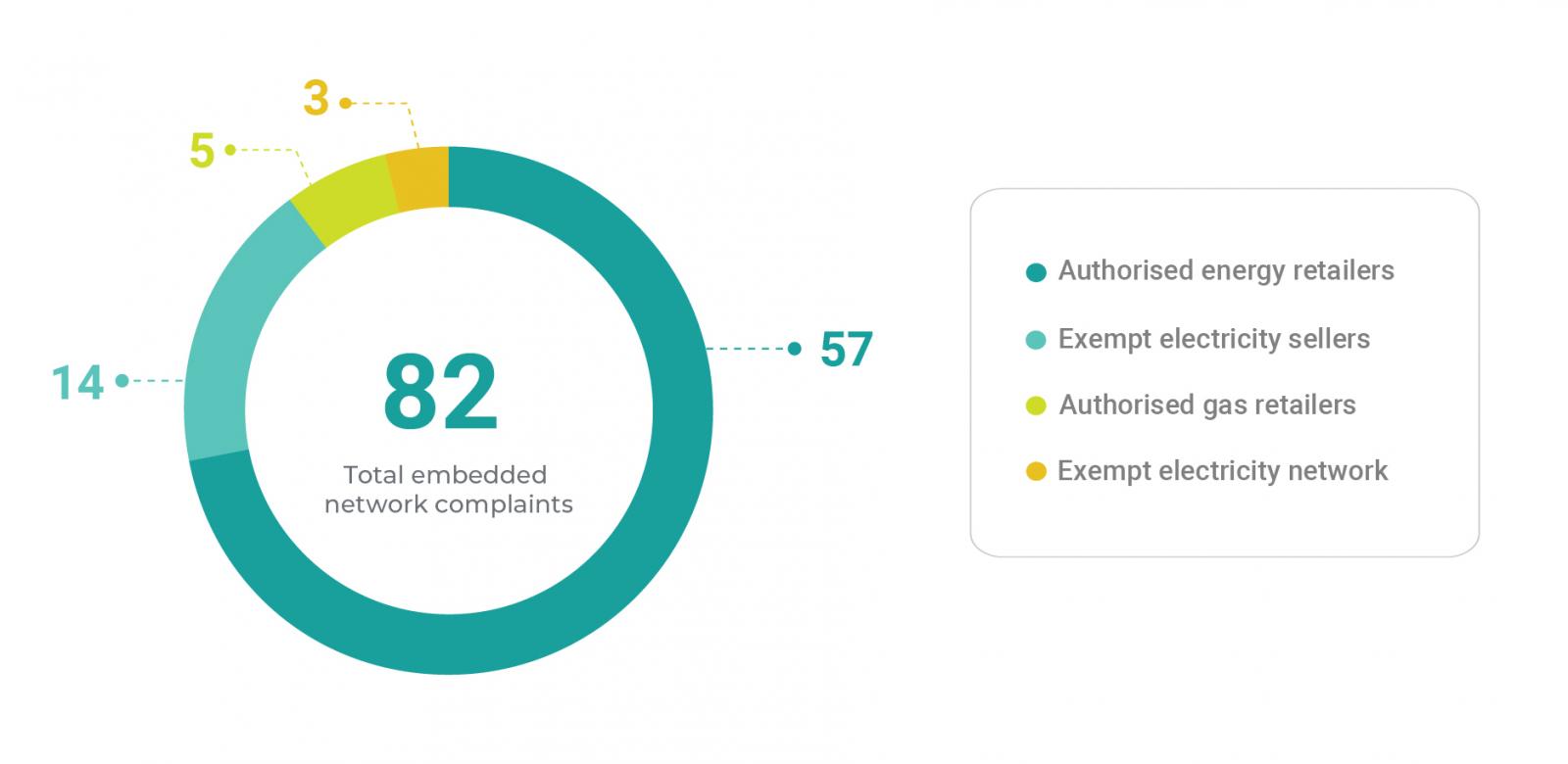-
Home
-
Publications and submissions
-
Reports
-
EWON Insights
-
EWON Insights Jan-Mar 2022
- Embedded network complaints and case studies
Embedded network complaints and case studies
This quarter EWON opened 82 complaints from embedded network customers. These customers complained about the following range of energy service providers:
- Electricity > Network > Exempt: 3
- Electricity > Not Allocated: 1
- Electricity > Retail > Authorised: 57
- Electricity > Retail > Exempt: 14
- Gas > Retail > Authorised: 5
- Non energy / Non water > Not Allocated : 1
- Water > Retail > WICA: 1
EWON closed 86 complaints from customers whose electricity or gas (including hot water) is supplied through an embedded network.

Click here to view the top 10 core issues for embedded network complaints closed this quarter
Click here to view the top 10 issues for embedded network complaints closed this quarter
Complaints about hot water heating services in gas embedded networks
EWON published a Spotlight On report on Hot Water Embedded Networks in March 2021.
After this, we engaged with the NSW and Commonwealth governments, the Australian Energy Regulator (AER), the Australian Energy Market Commission (AEMC) and the NSW Independent Pricing and Regulatory Tribunal (IPART) to seek a regulatory solution to extend adequate consumer protections for customers living in these networks.
Recently, the NSW government undertook community consultation that included questions about this issue, and the AER published its draft decision on its 2022 review of the Retail Exempt Selling Guideline. The AER has decided not to introduce an exemption class for entities on-selling gas where customers’ energy consumption is measured by a hot water meter because there is significant legal doubt as to whether the sale of bulk chilled or hot water constitutes a sale of energy for the purposes of section 88(1) of the Retail Law.
For decades the gas distributor Jemena Gas Networks and its predecessors supplied gas to apartment buildings using hot water meters to measure energy consumption. The AEMO Gas Retail Market Procedures (NSW and ACT) embeds an equally long-standing industry practice of using the flow through a hot water meter to measure the energy consumption of an on-market energy customer.
Growth in gas embedded networks that on-sell energy through a hot water service started when Jemena introduced a boundary meter network gas tariff in 2015. In November 2019, the AER’s draft decision on the Jemena Access Arrangement 2020-2025 rejected Jemena’s proposal to withdraw from individual hot water metering by July 2020. The reduction in consumer protections for customers moving into gas embedded networks was a significant factor in the AER’s draft decision.
In its draft determination on the Retail Exempt Selling Guideline, the AER stated that although the exemption framework could not be extended to these consumers, affected customers do have access to general consumer protections under the Australian Consumer Law (ACL). The following case studies highlight how the protections contained in the ACL are inadequate for people in this situation and customers in gas embedded networks need consumer protections designed for essential services.
Case Study: Cross metering of hot water in gas embedded network leads to affordability issue
A customer living in an embedded network where the energy is on-sold by an authorised electricity retailer was billed monthly for his electricity and hot water usage. He advised EWON that his electricity and hot water bills were always around $130 and $160 respectively. The customer advised EWON that he owed arrears of $776 and was initially confused by how it had built up so quickly. The customer then discovered that his direct debit arrangement had failed, and payments were not being made. The customer contacted the electricity retailer and was not offered a payment plan.
EWON contacted the retailer to confirm what actions had been taken to resolve the customer’s complaint. The retailer advised EWON that it had spoken to the customer since the complaint was made to EWON and a technician was being sent to the premises to check the metering. The retailer contacted EWON again to advise that the technician had identified a cross metering issue, which meant the customer was being billed for the hot water usage of another apartment.
The electricity retailer corrected the cross-metering issue and cancelled the bills issued for the incorrect meters. The retailer also confirmed that the direct debits had stopped. The balance of the account after the billing was corrected was $241 and the customer advised that this would be paid by the due date.
EWON was able to assist the customer as the retailer, an authorised retailer and hence an EWON member, chose to view the complaint as a whole. Technically, the complaint about the electricity bill was within EWON’s jurisdiction, while the complaint about the hot water bill was not.
Case Study: Customer disconnected from hot water and air conditioning services after missing payments
A customer complained to EWON that her air conditioning service and hot water supply had been disconnected due to non-payment of her energy debt. The customer advised EWON that she had an account for centralised services within her building (air conditioning and hot water) and had accumulated a significant debt of over $5,000 due to unemployment. The customer had contacted the authorised electricity retailer and agreed to a payment plan of $300 a month. An error then occurred with the customer’s direct debit and her payment failed, causing cancellation of the payment plan. The customer contacted the authorised electricity retailer again to request reconnection and re-establish the payment plan of $300 a month. The retailer refused her request and demanded full payment of her debt of over $5,000 to be reconnected. The customer advised that the disconnection would impact her three children.
EWON contacted the electricity retailer to clarify the process to disconnect the customer, including how the customer was notified. The retailer advised there were no specific rules for disconnection as air conditioning and hot water were not essential services. EWON noted that the customer considered hot water a necessity to look after her three children. The retailer advised that the customer had failed two payment plans and the debt was now $5,088. EWON negotiated with the electricity retailer to reconnect the hot water supply, but not the air conditioning, and to re-establish the direct debit payment arrangement of $300 a month. EWON spoke with the customer again, and she confirmed that the hot water supply had been reconnected and that she had set up her direct debit for $300 a month.

